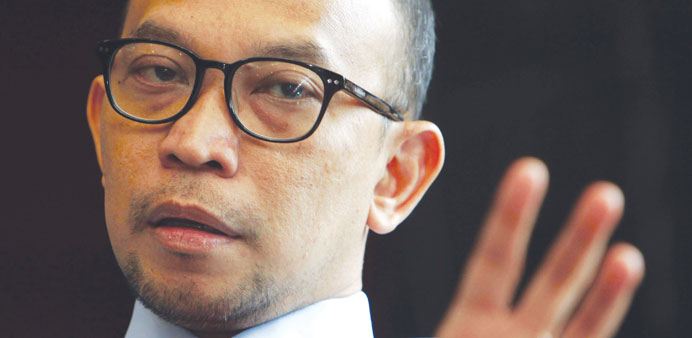Reuters/Jakarta
Indonesia’s budget for next year will put heavy emphasis on promoting domestic demand as the driver of growth as the country’s exports will remain weak, Finance Minister Chatib Basri said yesterday.
In an interview with Reuters, Basri conceded that this year’s 6.3% economic growth target would be hard to reach and said the figure was likely to end up “around” 6%, which is more in line with the view of private economists.
Last month, Indonesia’s central bank cut its 2013 growth forecast to 5.8-6.2% from 6.2-6.6%.
“The current global economic situation is not very promising... So the role of fiscal policy is quite clear. We have to provide stimulus for the economy,” said the Australian-educated economist who, at 47 years, is one of Indonesia’s youngest finance ministers.
Though economists said it is still too early to judge Basri’s performance since becoming minister in May, he has been widely praised in his role as head of the state investment board, overseeing a period of record foreign investment into Southeast Asia’s biggest economy.
But Basri, who retains his investment chief role, came to the job of finance minister just as the economic outlook for Indonesia began to cloud, with slowing, exports struggling, inflation surging and the rupiah slumping.
“It’s about time for Indonesia to change the composition of growth,” he said in his large office in the sprawling finance ministry compound, jazz playing in the background.
“Countries like Indonesia can’t continue to rely on natural resources or cheap labour. We have to move forward into the next stage of our development with ... innovation and technology,” the minister said.
In June, the government sharply cut fuel price subsidies — a move that it says will make available for the 2014 budget 18.4tn rupiah ($1.79bn) saved this year.
Basri said some 13tn rupiah of that will be earmarked for Indonesia’s notoriously inadequate infrastructure. The rest will go towards developing human resources and improving public transport.
The government’s budget proposal for 2014 will be unveiled tomorrow.
Basri said he hopes Indonesia can have a “good budget posture” in 2014 with a deficit of 1.49% of gross domestic product. By doing so, “we will able to reduce the debt to GDP ratio to become less than 33%, the lowest in our history, he said.
Basri forecast that this year’s budget deficit will be less than 2.4% of GDP.
Exports currently aren’t driving economic growth as they once did. Last year, Indonesia had its first annual trade deficit, and exports have been weakening further this year, falling 4.5% in June from a year earlier.
The minister, who is not a member of any political party, said domestic demand should be boosted by parliamentary and presidential elections. Domestic demand accounts for about 55% of the economy and government spending about another 6%.
“The only problem with private consumption is the inflation trap because it went up quite significantly in July,” he said. Annual inflation last month hit 8.61%, the highest rate in four and half years.
But pressures from volatile food prices and the impact of higher fuel costs should have tailed off by September and prices may even fall in October, he said.
Indonesia’s central bank is due to hold its monthly policy meeting today but is expected to keep the benchmark rate on hold after two successive increases.
However, several economists say it will have to raise rates again fairly soon because of inflation.
Inflation, among other factors, meant that the government had, for the moment, put on hold any plans for further fuel price subsidy cuts.
Commenting on a decline in capital investment growth, Basri said Indonesia needed to encourage investors to produce more in Indonesia, pointing to industries such as oil refining, communications equipment and basic metals.
“It doesn’t mean the solution for this is protectionism. We should invite investors to come to Indonesia to produce those products. We provide fiscal incentives.”

Chatib Basri: Focus on heavily stimulating domestic demand.
